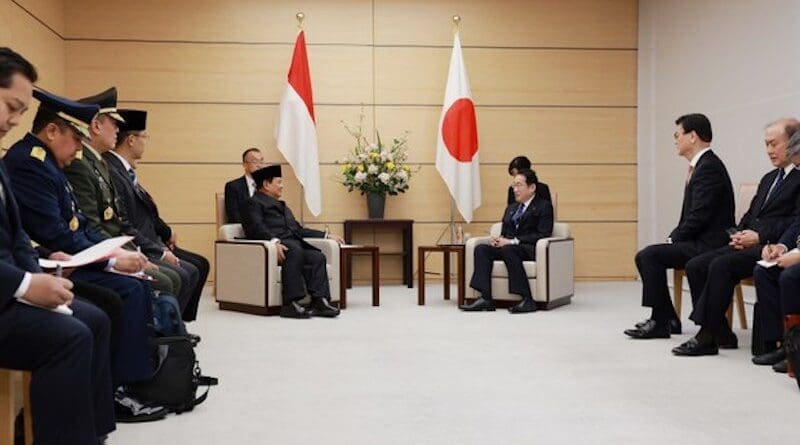During Tokyo Visit, Indonesia’s Prabowo Seeks Stronger Ties With Japan
By BenarNews
By Pizaro Gozali Idrus
Indonesian President-elect Prabowo Subianto called for stronger defense ties with Japan during talks with Prime Minister Fumio Kishida in Tokyo on Wednesday, shortly after he conveyed a message in Beijing about deepening a strategic partnership with China.
Analysts said Prabowo’s visits to China and Japan – a close ally of the United States in Asia – signaled a balancing act by Indonesia’s future leader as the rival superpowers compete for influence and a strategic edge in Southeast Asia.
Prabowo, who is to succeed term-limited President Joko “Jokowi” Widodo in October as leader of Southeast Asia’s largest country, serves as defense minister. He was making his first overseas trip since the presidential election in mid-February. No president-elect before him had ever undertaken such a trip.
“Our nations have already established a strong cooperative foundation. I call on Japan to work together to strengthen the relationship and enhance cooperation in defense sectors,” Prabowo said in a statement that his ministry issued about the meeting with Kishida.
The Japanese PM, for his part, highlighted the importance of a free and open Indo-Pacific region and the longstanding relations between Japan and Indonesia, according to a statement released by Indonesia’s Defense Ministry.
Prabowo traveled to Tokyo after visiting Beijing where he met with Chinese President Xi Jinping and Prime Minister Li Qiang. After his visit to Japan, Prabowo went on to Malaysia, according to local reports.
Kishida echoed Prabowo’s sentiment, expressing his desire to deepen bilateral collaboration, according to the Indonesian ministry.
“This visit is truly heartening. Japan and Indonesia have been close friends for a long time,” Kishida said, according to the statement. “I hope that we can elevate our partnership as like-minded nations sharing common values and principles.”
Prabowo and Kishida also discussed regional issues, including the East and South China seas, North Korea’s nuclear and missile programs along with the situation in Myanmar, according to a statement by the Japanese embassy in Jakarta.
“The two will continue to work together on those issues,” the embassy statement said.
In the East China Sea, Japan and China are locked in a territorial dispute over the Senkaku Islands – known as the Diaoyu Islands by the Chinese. In the far southern reaches of the South China Sea, tensions exist between Jakarta and Beijing over Chinese maritime activities in the waters around Indonesia’s Natuna Islands.
Kishida expressed Japan’s support for Indonesia’s accession to the Organization for Economic Cooperation and Development (OECD).
“Kishida also emphasized the importance of Japan’s cooperation with Indonesia in maintaining an open international order based on the rule of law,” the statement from the ministry said.
Additionally, Kishida expressed Japan’s commitment to security cooperation, which includes a December 2023 grant to Indonesia of patrol boats valued at 9.05 billion yen (U.S. $59.66 million).
Last week, news that China’s Xi had invited his future Indonesian counterpart raised eyebrows in Jakarta because no uninstalled president, who was several months away from taking office, had done this before. According to Jokowi’s office, the outgoing president had signed off on Prabowo’s trip.
In Beijing, Xi told Prabowo that China was willing to enhance “comprehensive strategic cooperation” with Indonesia and make positive contributions to regional and world peace, said a spokesman for the Indonesian Ministry of Defense.
As analysts viewed it, Prabowo’s visit to Japan was not just a courtesy call but a calculated effort to balance relations in the region.
“The visit was more impromptu and initiated by Prabowo rather than a formal invitation from the Japanese government,” said Raden Mokhamad Luthfi, an international relations lecturer at Al Azhar University of Indonesia.
Luthfi emphasized the significance of the visit, given Indonesia’s extensive defense collaborations with Western nations and Japan.
“Prabowo should present more concrete proposals during his meeting with Kishida, such as enhancing military and coast guard cooperation to counter China’s assertiveness in the South China Sea,” he told BenarNews.
Luthfi also said Indonesia should explore potential technology transfers from Japan for military advancements, considering Japan’s increasing openness in its defense industry.
Erik Purnama Putra, an analyst at the Indonesian Strategic and Defence Studies (ISDS), said the Tokyo visit likely was aimed at countering any impression of a China-leaning stance, given Indonesia’s ongoing need for U.S. and Western support in defense and economic sectors.
“Japan’s strained relations with China and its role as an extension of U.S. influence in East Asia are well-known,” he told BenarNews. “Economically, Indonesia may lean toward China, but our military ties are decidedly more Western-oriented.”
The visit also serves as a message to the U.S. that Prabowo is not a proxy for China, which could be crucial in persuading Washington to agree to sell F-15 fighter jets to Jakarta.
“Prabowo’s expertise in military diplomacy is a significant asset,” Putra said.
A recent study by ISDS and Kompas Research and Development found that nearly three-quarters of Indonesians see China’s activities in the South China Sea as a threat to Indonesia’s sovereignty.
Prabowo’s Tokyo visit reflects Indonesia’s commitment to its independent and active foreign policy, said Muradi, a professor of political science and security at Padjajaran University in Bandung.
“Prabowo is well-versed in Western political culture and doesn’t want to appear China-centric,” he told BenarNews.
“The visit to Japan is his way of affirming that his foreign engagements are not limited to China,” he said.
Muradi, who goes by one name, said he believed that Prabowo’s focus, when he takes office in more than six months, would be on sustaining Japanese investment in Indonesia rather than solely on defense cooperation.
“Prabowo places great importance on Japan’s economic contributions, as Japan is one of the major investors in Indonesia,” he said.
Japan’s investment in Indonesia amounted to $3.56 billion in 2022, placing it fourth behind Singapore, China, and Hong Kong, according to the National Investment Coordinating Board. From 2012 to 2022, Japan initiated a total of 35,013 investment projects in the country.

